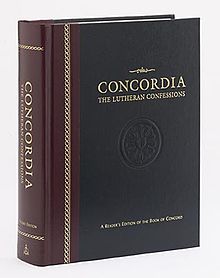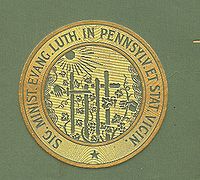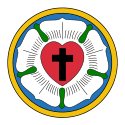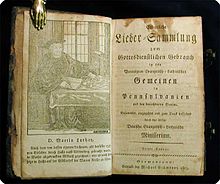- Pennsylvania Ministerium
-
Pennsylvania Ministerium Official Title: The German Evangelical Lutheran Ministerium of North America (1748-1792)
The German Evangelical Lutheran Ministerium of Pennsylvania and Adjacent States (1792-1918)
Memberships: General Synod (1820-1823; 1853-1864)
General Council (1867-1918)
Founding: August 26, 1748, in Philadelphia, Pennsylvania Successor church bodies: United Lutheran Church in America (1918-1962)
Lutheran Church in America (1962-1988)
Evangelical Lutheran Church in America (1988-present)The Pennsylvania Ministerium was the first Lutheran church body in North America. With the encouragement of Henry Melchior Muhlenberg, the Ministerium was founded at a meeting of German-American Lutheran clergy on August 26, 1748. The group was known as the "Ministerium of North America" until 1792, when it adopted the name "The Ministerium of Pennsylvania and Adjacent States."
The Pennsylvania Ministerium was also the source of the first Lutheran liturgy in America. Because of its unique place in the history of North American Lutheranism, the Ministerium continued to influence the church politics of Lutherans in America into the twentieth century.[1]
Contents
Founding
German settlers had been arriving in North America since the mid-seventeenth century, and they were particularly attracted by William Penn's promise of religious freedom in the colony of Pennsylvania. By 1683, the number was large enough to form communities such as Germantown (now a neighborhood in Philadelphia).[2] Many of these immigrants brought with them their Lutheran faith and began to form congregations in their new homeland.
By the mid-eighteenth century, there was a growing need for well-trained Lutheran clergy in the colonies. The Pietist foundation at the University of Halle responded to this need, and sent 24 clergymen to minister in the colonies in 1742.[3] Among those sent was Henry Melchior Muhlenberg. Muhlenberg's influence went beyond those congregations he served; he organized other Lutheran congregations in Pennsylvania so that they might work in cooperation. Such was his influence that Muhlenberg became regarded to be "the patriarch of the Lutheran church in North America.[4]
At Muhlenberg's request, German-American Lutheran pastors met together in Philadelphia on August 26, 1748. Six pastors and lay representatives from ten congregations attended the meeting, where they agreed to work together as the "ministerium of North America." They also adopted a common liturgy to be used in North America. This meeting has become known as "the most important event in the history of North American Lutheranism."[5]
The Ministerium remained a relatively informal association until a constitution was drawn up and agreed upon in 1781. Along with a formal constitution, it adopted the name of the "German Evangelical Lutheran Ministerium of North America." The churches of the ministerium followed a polity influenced by the Dutch Reformed model and by Muhlenberg's Pietism, and did not insist on strict adherence to the Lutheran Confessions.[6] During these early years, there were not only German pastors, but also Swedish pastors in the Ministerium. Members of the Ministerium could be found in Pennsylvania, New York, New Jersey, Maryland, Virginia, and even the Carolinas.[7]
In 1784, Frederick A. Muhlenberg (second son of the earlier patriarch) organized the growing number of Lutheran congregations and clergy in the state of New York into the Ministerium of New York. Mindful of this and other Lutheran church bodies being founded in North America, in 1792 the group in Philadelphia renamed itself "The Ministerium of Pennsylvania and Adjacent States".[8]
General Synod
In 1818, the Pennsylvania Ministerium began talks of organizing the various Lutheran church bodies in America, so that they could "stand in some or another in closer connection with one another."[9] At a meeting in Hagerstown, Maryland in October 1820, just such an organization was founded in the General Synod (formally titled the "Evangelical Lutheran General Synod of the United States of North America"). At the outset, this group consisted of the Pennsylvania Ministerium, along with the New York Ministerium and the Maryland-Virginia Synod.
The General Synod served largely in an advisory function—each church body within the Synod retained its own constitution and independence. The primary role of the Synod was to facilitate cooperation among the various church bodies. It was under the auspices of the General Synod, with the leadership of Samuel Simon Schmucker, that a Lutheran seminary and college were founded in Gettysburg, Pennsylvania.[10]
Despite its role in establishing the General Synod, the Pennsylvania Ministerium withdrew from the inter-Lutheran organization in 1823. Within the Ministerium, there was a close relationship between Lutheran and Reformed congregations, and many felt that the General Synod might jeopardize that relationship.[11] In addition, many in the Ministerium were wary of a centralized organization, and the control that it might exert over individual congregations.
Thus, in the years following, the Pennsylvania Ministerium remained an independent Lutheran church body. However, the Ministerium sought to maintain a relationship with the Synod, including continuing to send its ministerial students to the General Synod's seminary in Gettysburg, which was headed by Samuel Schmucker.
In the decades that followed, the Ministerium became less concerned with its relationship with the Reformed church and saw a significant increase in Lutheran identity and the importance of the Lutheran Confessions. Thus, in 1853, the Ministerium rejoined other Lutherans in the General Synod.[12] However, this renewed relationship would prove to be short-lived.
General Council
 The Book of Concord, which contains the documents known as the "Lutheran Confessions"
The Book of Concord, which contains the documents known as the "Lutheran Confessions"
As with many Protestant churches, the General Synod was split on the issue of the American Civil War in the 1860s. Yet this was not the biggest challenge to Lutheran unity in the middle of the 19th century. As the importance of the Lutheran Confessions grew among American Lutherans, Samuel Schmucker—who was once seen confessionally conservative—found himself on the outside of the consensus of other Lutherans.[13] In 1855, Schmucker, along with two other theologians from the Gettysburg seminary, penned the Definite Synodical Platform. This document downplayed the importance of the Confessions—indeed even suggested an edited "American Recension" of the Augsburg Confession—and sought to establish a distinctly American Lutheranism that was more at home with other Protestants in the country.[14]
The Definite Synodical Platform was not enough to cause the Pennsylvania Ministerium to leave the General Synod, but it was a foretaste of things to come. When the Frankean Synod, a Lutheran church body noted for its progressive politics and its utter disregard for the Lutheran Confessions, was admitted to the General Synod, the leadership of the Ministerium had seen enough. At the 1864 gathering of the General Synod, at which the Frankeans were admitted, the delegates from the Ministerium left in protest. Unfortunately, the delegates left before the General Synod passed a resolution affirming and strengthening their commitment to the Augsburg Confession.[15]
It is not clear whether the members of the Ministerium intended for this to be a permanent break, or a temporary protest. Regardless, it became permanent when the officials at the next Gathering of the General Synod refused to admit the delegates from the Ministerium. Thus, the Ministerium found themselves on their own.[16]
In 1864, unhappy with the direction of the General Synod and its seminary at Gettysburg, the Ministerium established a new seminary in Philadelphia, and asked Charles Porterfield Krauth to head the seminary (now known as the Lutheran Theological Seminary at Philadelphia).[17] This was followed, in 1867, with the Ministerium being joined by thirteen other church bodies in a more conservative and confessional organization known as the General Council.
United Lutheran Church in America
The Pennsylvania Ministerium remained a constituent church of the General Council from 1867–1918. In 1918, following the celebration of the 400th anniversary of the Reformation, the three Lutheran church bodies of Eastern America (The General Synod, the General Synod–South, and the General Council) reunited to form the United Lutheran Church in America. This event, while marking a watershed of unity among American Lutherans, also marked the end of the Pennsylvania Ministerium.[18] The ULCA would later join with other American Lutherans, in 1962 in the Lutheran Church in America, and in 1988 in the Evangelical Lutheran Church in America (which continues to be an active church body and is a direct descendant of the Pennsylvania Ministerium).[19]
References
- ^ See for example Lowell Almen, One Great Cloud of Witnesses: You and Your Congregation in the Evangelical Lutheran Church in America, (Minneapolis: Fortress, 1997) pp. 38-40
- ^ See for example, Theodore Tappert, "The Church's Infancy" in The Lutherans in North America, ed. E. Clifford Nelson (Philadelphia:Fortress Press, 1980) pp. 21-31.
- ^ Theodore Tappert, "The Church's Infancy" in The Lutherans in North America, ed. E. Clifford Nelson (Philadelphia:Fortress Press, 1980) p. 48.
- ^ Theodore Tappert, "The Church's Infancy" in The Lutherans in North America, ed. E. Clifford Nelson (Philadelphia:Fortress Press, 1980) p. 30.
- ^ Eric W. Gritsch, A History of Lutheranism, (Minneapolis:Fortress Press, 2002) p.175.
- ^ Eric Gritsch, A History of Lutheranism, (Minneapolis:Fortress Press, 2002) p.175.
- ^ Theodore Tappert, "The Church's Infancy" in The Lutherans in North America, ed. E. Clifford Nelson (Philadelphia:Fortress Press, 1980) p. 50.
- ^ Theodore Tappert, "The Church's Infancy" in The Lutherans in North America, ed. E. Clifford Nelson (Philadelphia:Fortress Press, 1980) p. 52.
- ^ H. George Anderson, "The Early National Period," in The Lutherans in North America, ed. E. Clifford Nelson (Philadelphia:Fortress Press, 1980) p. 116.
- ^ See the websites of the Lutheran Theogical Seminary at Gettysburg and Gettysburg College; both schools are currently affiliated with the Evangelical Lutheran Church in America.
- ^ H. George Anderson, "The Early National Period," in The Lutherans in North America, ed. E. Clifford Nelson (Philadelphia:Fortress Press, 1980) p. 122.
- ^ H. George Anderson, "The Early National Period," in The Lutherans in North America, ed. E. Clifford Nelson (Philadelphia:Fortress Press, 1980) 230
- ^ H. George Anderson, "The Early National Period," in The Lutherans in North America, ed. E. Clifford Nelson (Philadelphia:Fortress Press, 1980); See especially the description of Schmucker's early Confessionalism at p. 217, and the description of the shift in American Lutheranism on p. 221.
- ^ H. George Anderson, "The Early National Period," in The Lutherans in North America, ed. E. Clifford Nelson (Philadelphia:Fortress Press, 1980) p. 217-227.
- ^ H. George Anderson, "The Early National Period," in The Lutherans in North America, ed. E. Clifford Nelson (Philadelphia:Fortress Press, 1980) p. 232
- ^ H. George Anderson, "The Early National Period," in The Lutherans in North America, ed. E. Clifford Nelson (Philadelphia:Fortress Press, 1980) p. 232-233
- ^ Eric Gritsch, A History of Lutheranism, (Minneapolis:Fortress Press, 2002) p.192.
- ^ Fred W. Meuser, "Facing the Twentieth Century" in The Lutherans in North America, ed. E. Clifford Nelson (Philadelphia:Fortress Press, 1980) p. 372-373. Meuser especially addresses the role that the anniversary of the Reformation played in the foundation of the ULCA.
- ^ See the ELCA's "Key to ELCA Predecessor Church Bodies", retrieved July 10, 2007.
Categories:- History of Lutheranism
- Evangelical Lutheran Church in America predecessor churches
- 1748 establishments
- Religious organizations established in the 1740s
Wikimedia Foundation. 2010.



